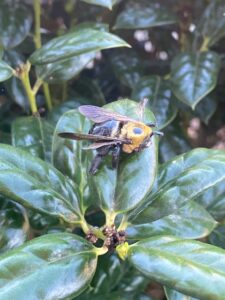 Carpenter bees are large, robust bees that are typically black and shiny with some species having yellow or white markings on their thorax and head. They have a stout body and can range in size from about 1/2 inch to 1 inch in length. Female carpenter bees have a smooth and shiny abdomen, while male carpenter bees have a patch of hair on their face. Carpenter bees also have large, powerful jaws that they use to burrow into wood to create nests for their young.
Carpenter bees are large, robust bees that are typically black and shiny with some species having yellow or white markings on their thorax and head. They have a stout body and can range in size from about 1/2 inch to 1 inch in length. Female carpenter bees have a smooth and shiny abdomen, while male carpenter bees have a patch of hair on their face. Carpenter bees also have large, powerful jaws that they use to burrow into wood to create nests for their young.
A carpenter bee infestation is easily identified by finding holes in wooden structures around your home. There will also be sawdust on the ground where they drill their holes, as well as a combination of pollen and bee excrement. They are very important pollinators and are beneficial to agriculture, however, they can also cause a lot of structural damage. Carpenter bees are active during the spring and summer months, typically from April to August, depending on the region and climate. During this time, they are busy building nests and laying eggs. However, once the weather starts to cool down in the fall, carpenter bees will begin to die off or go into hibernation. The bees will then emerge again in the spring to start the nesting cycle once again.
Carpenter bees are generally not aggressive towards humans and are considered to be relatively docile insects. Male carpenter bees can be territorial and may fly aggressively towards people or other animals that come near their nest sites, but they do not have a stinger and cannot cause harm. Female carpenter bees have a stinger but are not aggressive and will only sting if they are threatened or provoked.
If you have a large infestation it’s best to seek professional help. Freedom Pest Services is a family owned and operated, full service pest control company that provides residential and commercial carpenter bee treatment services for homes and businesses in York, Fort Mill, Rock Hill, & surrounding North Carolina areas since 2017! and the Our expert carpenter bee exterminators get rid of carpenter bee infestations fast, and work preventatively to keep the carpenter bees from coming back after they’ve been eliminated.

 Carpenter bees are large, robust bees that are typically black and shiny with some species having yellow or white markings on their thorax and head. They have a stout body and can range in size from about 1/2 inch to 1 inch in length. Female carpenter bees have a smooth and shiny abdomen, while male carpenter bees have a patch of hair on their face. Carpenter bees also have large, powerful jaws that they use to burrow into wood to create nests for their young.
Carpenter bees are large, robust bees that are typically black and shiny with some species having yellow or white markings on their thorax and head. They have a stout body and can range in size from about 1/2 inch to 1 inch in length. Female carpenter bees have a smooth and shiny abdomen, while male carpenter bees have a patch of hair on their face. Carpenter bees also have large, powerful jaws that they use to burrow into wood to create nests for their young.

